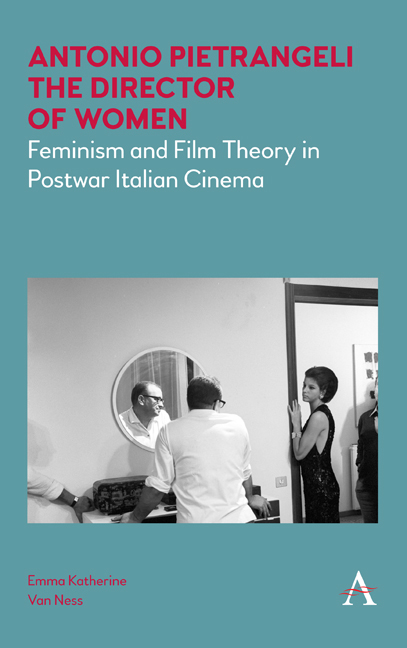Book contents
- Frontmatter
- Dedication
- Contents
- List of Illustrations
- Acknowledgments
- Vita
- Introduction: Antonio Pietrangeli, A Brief History
- Chapter 1 Pietrangelian Film Theory: From Neorealism to Feminism
- Chapter 2 Maid from the Margins: Il sole negli occhi
- Chapter 3 The Coming of Age of a Teenage Bride: Nata di marzo
- Chapter 4 Legally Bound: Political Realism and Prostitution in Adua e le compagne
- Chapter 5 Fantasmi a Roma: Sur-Realism and the Time-Image
- Chapter 6 The Dora Problem: La parmigiana, Piatti, Pietrangeli and Freud
- Chapter 7 Too Much Woman: Marriage, Power, and Excess in La visita
- Chapter 8 Breaking Faith: Il magnifico cornuto, Envy and the Crisis of Vision
- Chapter 9 Io la conoscevo bene … Or did I? Antonio Pietrangeli, the Author and the Actress
- Conclusion: Antonio Pietrangeli, Feminism and Film Theory
- Bibliography
- Index
Chapter 5 - Fantasmi a Roma: Sur-Realism and the Time-Image
Published online by Cambridge University Press: 06 May 2020
- Frontmatter
- Dedication
- Contents
- List of Illustrations
- Acknowledgments
- Vita
- Introduction: Antonio Pietrangeli, A Brief History
- Chapter 1 Pietrangelian Film Theory: From Neorealism to Feminism
- Chapter 2 Maid from the Margins: Il sole negli occhi
- Chapter 3 The Coming of Age of a Teenage Bride: Nata di marzo
- Chapter 4 Legally Bound: Political Realism and Prostitution in Adua e le compagne
- Chapter 5 Fantasmi a Roma: Sur-Realism and the Time-Image
- Chapter 6 The Dora Problem: La parmigiana, Piatti, Pietrangeli and Freud
- Chapter 7 Too Much Woman: Marriage, Power, and Excess in La visita
- Chapter 8 Breaking Faith: Il magnifico cornuto, Envy and the Crisis of Vision
- Chapter 9 Io la conoscevo bene … Or did I? Antonio Pietrangeli, the Author and the Actress
- Conclusion: Antonio Pietrangeli, Feminism and Film Theory
- Bibliography
- Index
Summary
Material Ghosts and Metacinema
Pietrangeli's Fantasmi a Roma (1961), like many of his other films, confounded critics. Maraldi writes that “in Pietrangeli's filmography— and even in the Italian productions of the time— Fantasmi a Roma is a very particular moment.” Stepping away from his concern with the female universe, the director himself explains that
it was my intention to tell, in the most elegant way possible, by continually winking at a certain cultural world and at certain moments in Italian history, a sort of fable, drawing out the singular and Roman (I said “Roman” not “fictional,” romanesca non romanzesca) idea of ghosts that give up winning lottery numbers and enter into people's homes to breathe in the smell of pasta e fagioli.
An attempt to tell about specifically Roman cultural phenomenon, the film is a formal development of Pietrangeli's realist commitment, what I will call sur-realism, a metacinematic commentary on the passing of time, a stylistic symphony or palimpsest that uses the past to comment, criticize and mock the present. To borrow from Perez's statement about time and cinema, “We don't take a movie as the present, for the present is where we are, and a movie, even if it is a world [like Rome] animated into a now, is a world elsewhere.” Precisely what Pietrangeli presents to the spectator, this Rome is a world cohabited by modern and paranormal realities, creating an on-screen, crossgenerational dialogue that makes the film a comment not only on the past and the present but on cinema itself.
The film's comedy, the “sur-“ in the sur-realism, is created by the ghosts, who provide both humor and social commentary, commenting “on” (the French sur) the absurdity of the present. The ghosts, spirits from across the generations of the royal Roviano family that linger on earth due to their violent deaths, are both surreal in their comedic content, juxtaposing irrational contrasts between the past and the present, as well as critical of modern values, trends and customs. A paranormal Greek chorus or ghostly Shakespearean clowns, they fault the modern world, making the spectator laugh and reconsider the follies of consumerist culture, technology and behavioral and gender roles and standards.
- Type
- Chapter
- Information
- Antonio Pietrangeli, The Director of WomenFeminism and Film Theory in Postwar Italian Cinema, pp. 113 - 132Publisher: Anthem PressPrint publication year: 2020



